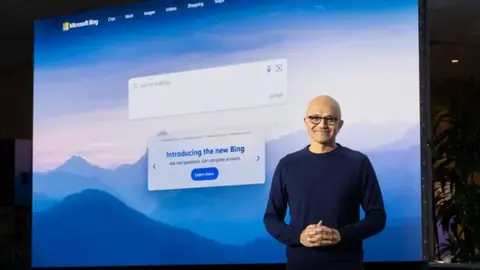Microsoft is expanding the capabilities of its ChatGPT-powered Bing Search and Edge browser experience. Two weeks ago, the company announced the integration of ChatGPT into Bing Search and Edge on desktop. And now, it has unveiled the addition of AI-assisted chat to the Bing and Edge mobile apps.
As mobile devices account for 64% of all searches, Microsoft has given the Bing and Edge apps for iOS and Android a fresh look and added natural conversation capabilities. Users can engage with the AI in the same way as the desktop version. Starting a chat session is possible by tapping the Bing icon on the mobile app. The AI can provide answers to questions in the form of bullet points, text, or simplified responses.
ChatGPT-powered Bing Search is available on Edge browser for Android and iOS
Microsoft has also added voice search to the Bing app on mobile and desktop versions, stating that “voice search provides more versatility in how you can deliver prompts and receive answers from Bing”. Those who applied to be on the waitlist for the ChatGPT experience on the web and now have access to the service will also be able to use the new Bing experience from the homepage of the Microsoft Edge mobile app.
In addition to the above features, Microsoft has integrated the AI-powered Bing with Skype. Allowing users to add Bing to any group chat and ask it to answer questions and provide information to the entire group. For example, if a family is planning a reunion, users can ask Bing for suggestions on travel destinations, weather forecasts, and interesting events around their time of travel, and everyone in the chat will get access to the results.
The AI Bing experience on Skype or mobile is available worldwide as a preview. And users can sign up for Microsoft’s waitlist to gain access to it. Those who are already on the Bing preview experience should have immediate access to these features.
Microsoft is taking advantage of its ChatGPT technology to improve its Bing Search and Edge browser experience on mobile devices. With natural conversation capabilities, voice search, and integration with Skype, the AI-powered Bing can provide users with personalized and informative search results in a seamless and intuitive manner.
ChatGPT integration in Bing
Recently, ChatGPT has been integrated into the Bing search engine and Microsoft Edge browser. Which has enhanced the user experience of these platforms.
Bing search engine is a web search engine owned and operated by Microsoft. It is one of the most popular search engines worldwide. And the integration of ChatGPT has made it even more powerful. With the integration of ChatGPT, users can now get more personalized and accurate results. When a user types in a question or query, ChatGPT provides relevant answers that are tailored to the user’s search history and preferences. This means that users can now get more specific and precise results that are relevant to their needs.
In addition to the Bing search engine, ChatGPT has also been integrated into the Microsoft Edge browser. Microsoft Edge is a web browser developed by Microsoft and is included in the Microsoft Windows operating system. The integration of ChatGPT has made browsing the internet more seamless and interactive. Users can now get more personalized and relevant content based on their search history and preferences.
The integration of ChatGPT in Bing search engine and Microsoft Edge browser has also improved the user’s ability to multitask. Users can now search the web and get relevant answers without leaving their current tab. For instance, a user can ask ChatGPT to provide directions to a location. While still browsing the web in the current tab. This feature is particularly useful for users who multitask or have limited screen space.
The integration of ChatGPT has made it possible for users to communicate with the search engine and browser using natural language. This means that users can ask questions and get answers as if they were talking to a human being. The chatbot’s responses are conversational and personalized, which makes the user feel more engaged and valued.
